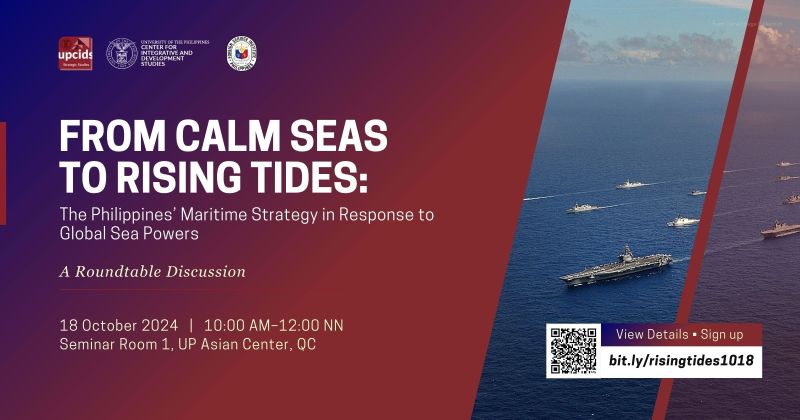From Calm Seas to Rising Tides: The Philippines’ Maritime Strategy in Response to Global Sea Powers | A Roundtable

The Strategic Studies Program (SSP) of the UP Center for Integrative and Development Studies (CIDS) and the Foreign Service Institute are organizing a roundtable discussion, “From Calm Seas to Rising Tides: The Philippines’ Maritime Strategy in Response to Global Sea Powers” on 18 October 2024, 10:00 am–12:00 noon, Seminar Room 1, Asian Center, University of the Philippines Diliman.The lecture is free and open to the public, but seating is available on a first-come, first-served basis. Participants are encouraged to register.
Concept Note
The global maritime landscape is being significantly influenced by escalating power struggles, with sea lanes becoming crucial arenas for geopolitical and economic control. For the Philippines, a nation surrounded by bodies of water, this presents both unique challenges and opportunities. With over 50% of the world’s economy transported via sea routes (The Economist 2024), securing freedom of navigation, trade routes, and the country’s Exclusive Economic Zone (EEZ) is critical to the nation’s sovereignty and economic security. The potential for conflict in these waters is heightened by growing military presence, including China’s projection of surpassing U.S. naval power in the Pacific by 2035.
The roundtable discussion will look into potential diplomatic strategies, partnerships, and maritime legislation that could enhance the country’s capacity to protect its maritime zones without provoking unnecessary conflict. Participants can reflect on how the Philippines can leverage its strategic location, existing resources, and potential partnerships to ensure national security and contribute to building regional stability.
Roundtable topics
The discussion will center on the following questions:
-
- How should the Philippines respond to the increasing presence and operations of global sea powers?
- How can the Philippines balance internal defense priorities with the need to enhance external maritime security?
- How can the country strengthen its maritime situational awareness and surveillance capabilities?
- What diplomatic and strategic partnerships should the Philippines prioritize for maritime security?
- How can the Philippine Navy contribute to regional stability and economic security while building its naval capabilities?
Speakers
Capt. Nerelito P. Martinez
Head Planner, Philippine Navy
Captain Nerelito Martinez has been instrumental in organizing significant naval engagements, including Exercise SEAGULL 2022, a collaborative training initiative with the Royal Brunei Navy aimed at enhancing defense diplomacy and improving interoperability between the two nations.
He has been deeply involved in the Navy’s modernization efforts, contributing to strategic plans such as the “Philippine Fleet Desired Force Mix” in 2012, which outlines the future acquisition of critical naval assets. He also participated in the International Fleet Review 2022 in Japan, which reinforced naval cooperation between the Philippines and other regional powers.
Capt. Dianne Faye C. Despi
Scholar and Officer, Philippine Navy
Cpt. Dianne Faye C. Despi of the Corps of Professors, Armed Forces of the Philippines, has significant contributions to maritime security and defense studies. Currently, she is a Fulbright Scholar pursuing a PhD in International Relations at the University of Delaware. Her article, “Sea Power in the 21st Century: Challenges and Opportunities for the Philippine Navy” (Asian Politics & Policy, 2017), examines the evolving role of sea power and its critical importance for the Philippine Navy and modern maritime security challenges. In 2022, she was one of three Philippine delegates to the Southeast Asian Young Leaders’ Program at the 19th Asia Security Summit.
Moderator
The roundtable discussion will be moderated by Ms. Xylee C. Paculba, a retired Philippine Navy Captain who has served with distinction for over two decades. She is currently a Senior Lecturer in the Department of Political Science, University of the Philippines Diliman.
Her expertise encompasses maritime security, maritime domain awareness, and the role of women in peace and security. Paculba acts as an independent consultant for national and international organizations, with a primary emphasis on gender and development issues, as well as security matters. As a research fellow at UP CIDS Strategic Studies Program, she is presently engaged in a case study research on foreign interference operations in three geographic locations—Palawan, Northern Luzon, and Mindanao. (UP Political Science website and Maritime Review).
Queries and Organizers
For queries, please email: [email protected]
The roundtable is organized by the Strategic Studies Program of the University of the Philippines Center for Integrative and Development Studies (UP CIDS), UP’s policy research unit. SSP is one of UP CIDS’ 16 Research Programs, and focuses on international relations, foreign policy, and related issues. Learn more and download SSP policy papers for free.